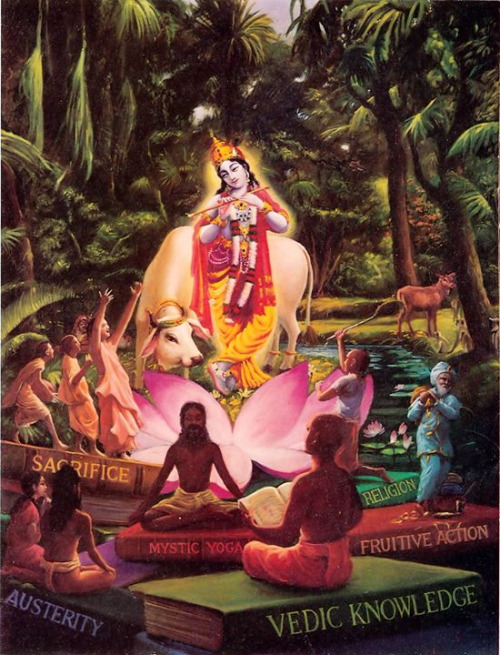Question: While reading Srimad Bhagavatam (Canto 1, Ch 4) I read that Srila Vyasdeva was not satisfied at heart although he finished compiling the 4 vedas, Mahabharat, 108 Upanishads, puranas & Vedanta Sutras. The reason is also given: “He did not glorify the Supreme Personality of Godhead & pure devotional service.”
My questions:
1. Does this mean that without Shrimad Bhagavatam, the Vedas are not perfect & complete?
Answer by Romapada Swami :
Srimad Bhagavatam is an integral part of the Vedas; it is described as the cream of Vedic knowledge or as the ripened fruit of the Vedic tree. The most valuable part of a tree is its fruit, and so also the Bhagavatam represents the essence of the Vedas. So, yes, Vyasadev’s presentation of the Vedas remained incomplete until he elaborately presented the Srimad Bhagavatam; hence he was feeling despondent and unfulfilled.
2. How did people in the previous ages attain pure devotional service if S.B. was not available?
Answer by Romapada Swami:
The Vedas are all eternal – including the Upanishads, Puranas and Itihasas. What Srila Vyasadeva did at the end of Dvapara yuga was to compile and present them in a systematic written form for the benefit of the less-qualified population of the Kali age.
Within the Bhagavatam itself we find conversations and narrations spanning many previous ages. The narrations of Prahlad preaching pure devotional service to his classmates and demoniac father, or Lord Kapila instructing His mother Devahuti, for instance, took place in Satya yuga. Also, as stated in BG 4.7, the Lord Himself descends in every age to establish the yuga-dharma, just as He did in the form of Nara-Narayana Rishi or Lord Caitanya and He also sends His empowered incarnations and representatives such as Vyasadev. Thus, by the arrangement of the Lord, the path of pure devotion is made available to people in all ages, according to time, place and circumstance.







